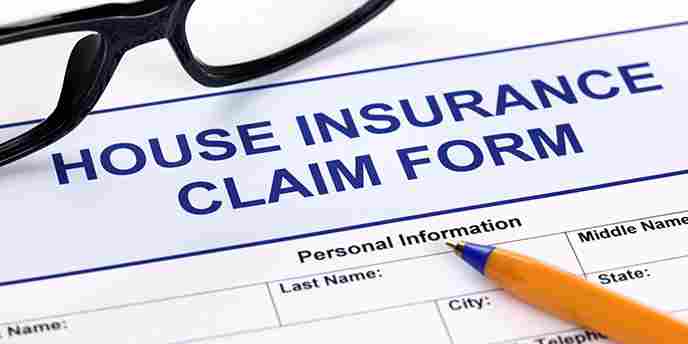Insurance is a necessity when you become a homeowner. It not only provides financial protection for your home, but also to your personal belongings within it. With that being said, it’s important to know when to use homeowners insurance and what it will cover.
When any kind of damage occurs to your home, it’s undoubtedly a stressful situation, but submitting a claim to your insurance without doing your research first could lead to a denied claim and a possible hike in your premium.
How Does Home Insurance Work?
Homeowners insurance is made up of coverage levels that may help pay to repair your home and replace your belongings if they are damaged by hazards, such as theft or fire. It could also help cover costs if you accidentally damage another person’s property, or if someone is injured at your home.
It’s important to understand what your policy actually covers. Standard policies include some causes of loss (such as wind damage, fires or theft) but not others (such as earthquakes and flooding). Save yourself the hassle and avoid filing a claim for an uncovered event.
“File a claim with your insurance company when you have a loss that is covered by your home insurance policy that exceeds your deductible.” Janet Ruiz | Insurance Information Institute
When to Use Homeowners Insurance
You Have Significant Damage or Total Loss
This is primarily what homeowners insurance is most useful for — when your home suffers a loss so great after an unexpected incident that it becomes unlivable. In a situation like this, you should definitely file a claim to recover your losses.
The Cost of Repair Exceeds Your Deductible
If part of your roof blows off and the estimate for repair is $5,000, when your deductible is $1,000, file a claim. If you incur an expensive repair or replacement to fix your home, and it was caused by a covered loss, you should use homeowners insurance to help pay for it.
You Haven’t Submitted a Claim in Three or More Years
Insurers take your claims history into account when they decide if they will cover you and what to charge for your premium. Statistically — whether for home or car insurance – if you’ve previously filed a claim, you’re more likely to file additional claims in the future, which makes you riskier to insure. When you do need to file claims, make sure to space them out as much as possible.

What Homeowners Insurance Covers
Coverage for the Structure of Your Home
Coverage for Your Personal Belongings
Liability Coverage
Additional Living Expenses (ALE) Coverage
ALE will cover the additional costs of relocating while your home is being rebuilt if your property is deemed unlivable from the damage of an insured disaster (i.e., hotel bills, restaurant meals and other costs beyond your usual living expenses).
Pro Tip: “When purchasing coverage for the structure of your home, remember this simple guideline: Purchase enough coverage to rebuild your home. Check with local builders to find out current building costs. Let your insurance company know if you remodel or add on to your home in case of a covered loss.” Janet Ruiz | Insurance Information Institute
What Homeowners Insurance Doesn’t Cover
Your home insurance policy will not cover every possible disaster or mishap that can happen. If your neighborhood is hit by certain types of natural disasters and your home suffers structural damage, the loss will likely not be covered by your insurance carrier.
“A standard policy will NOT pay for damage caused by a flood, earthquake or routine wear and tear. Flood and earthquake policies are sold separately.” Janet Ruiz | Insurance Information Institute
Damage Caused by Animals
Harm caused by animals, birds, insects or other vermin to your home or other structures on your property is unlikely to be covered. It is considered your responsibility to monitor and protect your property against insect invasions and other forms of slowly occurring damage.
Natural Disasters
Earthquakes, floods and other natural disasters are not typically covered by insurance policies. If you live in a region that is high-risk for these events, it’s best to look into other types of catastrophe insurance that make sense for your area, such as flood or windstorm insurance. Additionally, other types of water damage to your property are not usually included in a standard policy.
Vehicle Damage on Your Property
The line may be blurry here between your car and home insurance. While your home insurance will not cover any damage to the vehicle itself, it may provide coverage for any personal items that are taken from your car, depending on their value.

How to Get the Most Out of a Home Insurance Claim
Report Any Crime to the Police and Take Photos of Damage
If the damage was a result of theft or vandalism, report it to the local police immediately. Take photos of the damage, and make sure to get a copy of the police report for your insurer.
Contact Your Insurance Company and File a Claim
Before formally filing a home insurance claim, ask your insurance agent the following questions:
Common Reasons for a Claim Denial: Home insurance claims are not frequently denied, but usually occur because the homeowner is unaware of exclusions to a standard insurance policy, such as those for flood or earthquake damage.
Prepare a List of Damaged or Lost Items
You will need to substantiate your loss, so make a list of destroyed or damaged items and their estimated costs. Make a copy of the list for your adjuster when they come for an in-person visit.
Have an Adjuster Inspect the Damage
Your insurance company will arrange for an adjuster to come and inspect your home in person. They will review the property damage to determine how much the insurance company should pay for the loss.
Make Temporary Repairs and Keep Receipts
Within reason, take the steps needed to make your home livable again. Save receipts to submit to your insurance company for reimbursement. If your property is unlivable, most policies provide coverage for additional living expenses, but you’ll need to provide proof of the costs.
Ask Questions
Don’t be afraid to ask your insurance agent or your state department of insurance any questions you may have along the way. Once the terms of your settlement are agreed upon, state laws require that your payment is promptly sent.
Know How to Clean Up After a Disaster
If you need help after disaster strikes, use our thorough guides to clean up safely and efficiently:
